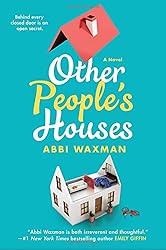Other People's Houses (Waxman)
| Article Index | Summary | Author Bio | Book Reviews | Discussion Questions | Full Version |
|---|
Other People's Houses
Abbi Waxman, 2018
Penguin Publishing
352 pp.
ISBN-13: 9780399587924
Summary
A hilarious and poignant new novel about four families, their neighborhood carpool, and the affair that changes everything.
At any given moment in other people's houses, you can find … repressed hopes and dreams … moments of unexpected joy … someone making love on the floor to a man who is most definitely not her husband…
*record scratch*
As the longtime local carpool mom, Frances Bloom is sometimes an unwilling witness to her neighbors' private lives. She knows her cousin is hiding her desire for another baby from her spouse, Bill Horton's wife is mysteriously missing, and now this...
After the shock of seeing Anne Porter in all her extramarital glory, Frances vows to stay in her own lane.
But that's a notion easier said than done when Anne's husband throws her out a couple of days later. The repercussions of the affair reverberate through the four carpool families—and Frances finds herself navigating a moral minefield that could make or break a marriage. (From the publisher.)
Author Bio
• Birth—1970
• Where—England, UK
• Education—University College London
• Currently—lives in Los Angeles, California
Abbi Waxman is a novelist whose books include The Garden of Small Beginnings (2017), Other People's Houses (2018), and The Bookish Life of Nina Hall (2019). She worked in advertising for many years, which is how she learned to write fiction.
Wasman is a chocolate-loving, dog-loving woman who lives in Los Angeles and lies down as much as possible. She has three daughters, three dogs, three cats, and one very patient husband. (Adapted from the publisher.)
Book Reviews
[A] “gaggle of middle-class white people”—and all of the comedy, drama, and quotidian details that make up their lives.… Hilarious ruminations about child-rearing, shopping, and other parents give this broad appeal.
Publishers Weekly
Waxman is a gifted storyteller with an impressive talent for penning realistic dialog for adults and children: no easy feat. For fans of fast-moving contemporary humorous fiction about women and families. —Samantha Gust, Niagara Univ.Lib., NY
Library Journal
[A] far-reaching topic… sprinkle[d] with spicy dialogue.… Frances is equal parts warmth and snark as she considers her friends and neighbors through the lens of TMI. [For] those who like to turn pages quickly without sacrificing complex characters.
Booklist
[C]harming yet provocative.…Waxman is a master at purveying the wry humor that rides just below the surface of even the tough times. An immensely enjoyable read.
Kirkus Reviews
Discussion Questions
1. In this book the neighborhood plays an important role. What other situations create this kind of community, and how does seeing people every day change your relationship to them?
2. The central character, Frances Bloom, is someone who likes to help, because it makes her feel useful. Do you know someone like this? Do you find it easier to help or be helped?
3. Frances and Michael have a very happy but not very romantic marriage. Do you think that this will eventually drive them apart?
4. Anne Porter has an affair and nearly destroys her marriage. How important is sexual fidelity? Is it the most important element in a marriage? Can trust be rebuilt after a betrayal of this kind?
5. How much do children understand their parents’ marriage? How hard is it to maintain privacy in a relationship once you have children?
6. Sara and Iris are experiencing communication problems in their marriage, although it’s very strong. Have you gone through something similar, where communication breaks down for no apparent reason, and then becomes difficult to reopen?
7. Anne felt she was someone else in her affair, that it was something just for her. Ava also mentions a strong desire to be her own person, driving her own choices. How hard is it to balance a sense of self with responsibilities within a family?
8. Frances and Ava are navigating their changing relationship as Ava becomes more independent. Did you struggle against your parents or one parent in particular as you were becoming an adult? How do you think the experience of adolescence has changed since you were a teenager?
9. The title, Other People’s Houses, alludes to the impression one gets of someone just by looking at them. How much can you really tell about someone based on their home, or the way they dress? Is appearance an expression of character, or armor?
10. Bill and Julie Horton are dealing with a challenging time in a very private way. What do you think are the advantages and disadvantages of approaching it this way?
(Questions issued by the publisher.)
Site by BOOM
![]()
LitLovers © 2024


